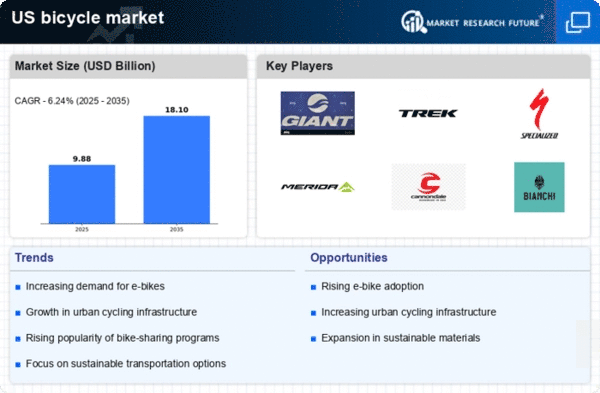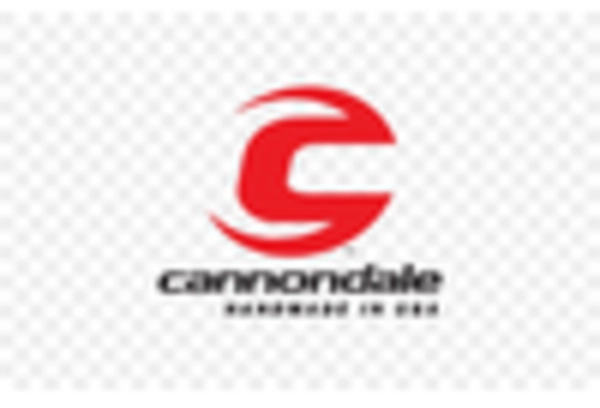Health and Fitness Awareness
The rising awareness of health and fitness among the US population is a crucial driver for the bicycle market. As individuals become more health-conscious, they are seeking activities that promote physical well-being. Cycling is recognized as an effective form of exercise that improves cardiovascular health, builds muscle strength, and enhances mental well-being. Recent surveys indicate that nearly 50% of adults in the US engage in regular cycling for fitness purposes. This trend is likely to propel the bicycle market forward, as manufacturers respond to the demand for high-quality bicycles designed for fitness enthusiasts. Additionally, community cycling events and fitness programs are further encouraging participation, creating a robust market for bicycles.
Environmental Regulations and Policies
Increasing environmental regulations and policies in the US are shaping the bicycle market. Governments at various levels are implementing initiatives aimed at reducing carbon emissions and promoting sustainable transportation. For instance, tax incentives for electric bicycles and funding for bike-sharing programs are becoming more common. These policies not only encourage individuals to choose bicycles over motor vehicles but also stimulate growth in the bicycle market. Data suggests that states with strong bicycle-friendly policies have experienced a 20% increase in bicycle sales. As environmental concerns continue to rise, the bicycle market is poised to expand, driven by both consumer demand and supportive governmental frameworks.
Technological Innovations in Bicycle Design
Technological innovations are playing a pivotal role in the evolution of the bicycle market. Advances in materials science and engineering have led to the development of lighter, more durable bicycles that enhance performance and user experience. Features such as integrated GPS, smart connectivity, and electric assist are becoming increasingly popular among consumers. The introduction of e-bikes has particularly transformed the market, appealing to a broader demographic, including commuters and recreational cyclists. Recent market analysis indicates that e-bikes account for approximately 15% of total bicycle sales in the US, a figure that is expected to grow. The bicycle market is likely to continue evolving as manufacturers invest in research and development to meet the changing preferences of consumers.
Urbanization and Infrastructure Development
The ongoing trend of urbanization in the US is significantly influencing the bicycle market. As cities expand and populations increase, there is a growing demand for sustainable transportation options. Urban planners are increasingly incorporating bicycle lanes and infrastructure into city designs, which encourages cycling as a viable mode of transport. According to recent data, cities with dedicated bike lanes have seen a rise in cycling rates by approximately 30%. This shift not only promotes healthier lifestyles but also reduces traffic congestion and pollution. The bicycle market is likely to benefit from these developments, as more individuals opt for bicycles over cars for short commutes, thereby increasing sales and fostering a culture of cycling in urban areas.
Rising Interest in Eco-Friendly Transportation
The growing interest in eco-friendly transportation options is a significant driver for the bicycle market. As awareness of climate change and environmental issues increases, more consumers are seeking sustainable alternatives to traditional vehicles. Bicycles are viewed as a low-impact mode of transport that contributes to reducing carbon footprints. Recent studies show that nearly 60% of consumers in the US are willing to switch to bicycles for short trips to minimize their environmental impact. This shift in consumer behavior is likely to bolster the bicycle market, as manufacturers respond with eco-friendly products and marketing strategies that emphasize sustainability. The trend suggests a promising future for the bicycle market as it aligns with broader societal values.
















